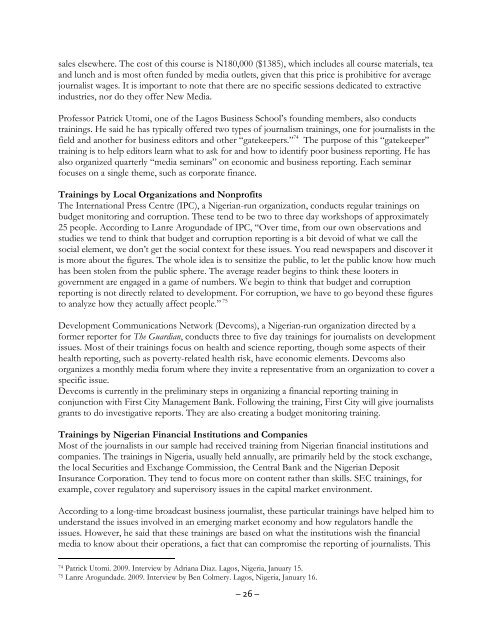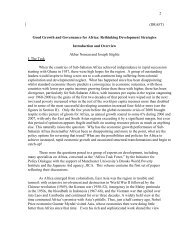sales elsewhere. The cost of this course is N180,000 ($1385), which includes all course materials, teaand lunch and is most often funded by media outlets, given that this price is prohibitive <strong>for</strong> averagejournalist wages. It is important to note that there are no specific sessions dedicated to extractiveindustries, nor do they offer New Media.Professor Patrick Utomi, one of the Lagos Business School’s founding members, also conductstrainings. He said he has typically offered two types of journalism trainings, one <strong>for</strong> journalists in thefield and another <strong>for</strong> business editors and other “gatekeepers.” 74 The purpose of this “gatekeeper”training is to help editors learn what to ask <strong>for</strong> and how to identify poor business reporting. He hasalso organized quarterly “media seminars” on economic and business reporting. Each seminarfocuses on a single theme, such as corporate finance.Trainings by Local Organizations and NonprofitsThe International Press Centre (IPC), a Nigerian-run organization, conducts regular trainings onbudget monitoring and corruption. These tend to be two to three day workshops of approximately25 people. According to Lanre Arogundade of IPC, “Over time, from our own observations andstudies we tend to think that budget and corruption reporting is a bit devoid of what we call thesocial element, we don’t get the social context <strong>for</strong> these issues. You read newspapers and discover itis more about the figures. The whole idea is to sensitize the public, to let the public know how muchhas been stolen from the public sphere. The average reader begins to think these looters ingovernment are engaged in a game of numbers. We begin to think that budget and corruptionreporting is not directly related to development. For corruption, we have to go beyond these figuresto analyze how they actually affect people.” 75Development Communications Network (Devcoms), a Nigerian-run organization directed by a<strong>for</strong>mer reporter <strong>for</strong> The Guardian, conducts three to five day trainings <strong>for</strong> journalists on developmentissues. Most of their trainings focus on health and science reporting, though some aspects of theirhealth reporting, such as poverty-related health risk, have economic elements. Devcoms alsoorganizes a monthly media <strong>for</strong>um where they invite a representative from an organization to cover aspecific issue.Devcoms is currently in the preliminary steps in organizing a financial reporting training inconjunction with First City Management Bank. Following the training, First City will give journalistsgrants to do investigative reports. They are also creating a budget monitoring training.Trainings by Nigerian Financial Institutions and CompaniesMost of the journalists in our sample had received training from Nigerian financial institutions andcompanies. The trainings in Nigeria, usually held annually, are primarily held by the stock exchange,the local Securities and Exchange Commission, the Central Bank and the Nigerian DepositInsurance Corporation. They tend to focus more on content rather than skills. SEC trainings, <strong>for</strong>example, cover regulatory and supervisory issues in the capital market environment.According to a long-time broadcast business journalist, these particular trainings have helped him tounderstand the issues involved in an emerging market economy and how regulators handle theissues. However, he said that these trainings are based on what the institutions wish the financialmedia to know about their operations, a fact that can compromise the reporting of journalists. This74 Patrick Utomi. 2009. Interview by Adriana Diaz. Lagos, Nigeria, January 15.75 Lanre Arogundade. 2009. Interview by Ben Colmery. Lagos, Nigeria, January 16.– 26 –
journalist said he has, however, “managed to keep my professionalism intact, allowing very littleimpact of sponsorships on my reporting and analysis.”Private companies also occasionally provide trainings <strong>for</strong> business journalists in Nigeria. A journalistat The Guardian said he had attended a training in 2005 organized by private companies, Soul Command TransCorp of Nigeria, that focused on stock market reporting. Professor Nwuneli said he’s alsoseen oil companies set up training organizations in Nigeria, which they use to influence journalists. 76The Impact of TrainingsTraining is important to creating systematic improvement in business and economic journalism inNigeria, and interviewees consistently reported that it will necessarily change the situation <strong>for</strong> thebetter. According to a journalist with The Punch, “Training can never leave you at the same point aswhere you started from. It takes you to a new level. It makes you feel that you are also somebodywithin society. There is something you know that the next person may not, or something you knowthat the next person knows. And if the two of you know the same thing, it makes you feel like youare on the same page, and nobody feels inferior.” 77 As would be expected, there were ways in whichjournalists experienced some differences in the ways their careers were impacted. However, they allreported benefiting from the trainings in a number of consistent ways.Impact on ReportingTraining has had a significant impact on the reporting of economic and business journalists inNigeria. For some, it has been an opportunity to advance their skills and become prominentreporters in their industry. For others, it was their first exposure to training in reporting and writingskills. A journalist with The Guardian said she came into the job without any training on how to be ajournalist, having gone to university instead to study English literature. 78 This was her firstopportunity to learn this material first hand. A journalist with Business Day said trainings have been“useful particularly in understanding the basic 101 of business reporting, reporting the economy,capital markets, <strong>for</strong>eign exchange and the financial system.” 79Training has played an important role in helping journalists understand the businesses behindbusiness reporting, which is something they generally don’t receive from their university education.“Very little is known about the conduct and nature of businesses, because they are shrouded insecrecy,” said a <strong>for</strong>mer journalist from This Day. 80 “Now what these trainings help to do is to equipthe journalists on how to find out about the operations of these businesses in different countries,like oil prospecting companies in Nigeria. These trainings help to track revenues, to track taxes, totrack evasion. Journalists otherwise would not have known how to go about it without thesetrainings.”Many journalists cited practical reporting and writing skills as key components of their trainingexperience. This is largely because journalism education in Nigerian universities is so heavilytheoretical. A <strong>for</strong>mer journalist from This Day said that these practical sessions help him actuallylearn how to report – they helped him know what to write, what to ask and what opportunities are76 Emman Onuora Nwuneli. 2009. Interview by Ben Colmery. Lagos, Nigeria, January 13.77 Nigerian Interviewee #4. 2009. Interview by Ben Colmery. Lagos, Nigeria, January 13.78 Nigerian Interviewee #9. 2009. Interview by Ben Colmery. Lagos, Nigeria, January 20.79 Nigerian Interviewee #22. 2009. Interview by Ben Colmery and Adriana Diaz. Lagos, Nigeria, January 9.80 Nigerian Interviewee #20. 2009. Interview by Ben Colmery. Lagos, Nigeria, January 15.– 27 –
- Page 1 and 2: THEREWILLBE INKA study of journalis
- Page 3 and 4: AcknowledgementsThis paper has bene
- Page 7 and 8: Executive SummaryPurpose of the Rep
- Page 9 and 10: journalists in these countries that
- Page 11 and 12: Existing International Training Opp
- Page 13 and 14: • Consumer Affairs and Informatio
- Page 15 and 16: Background 3Of the three countries
- Page 17 and 18: pervasive conflict in the Niger Del
- Page 19 and 20: 3) Crises or disruptions, where som
- Page 21 and 22: Low pay and low regardOne of the mo
- Page 23 and 24: Even in cases where working journal
- Page 25 and 26: But while some reporters think FOIB
- Page 27 and 28: When asked how much the media could
- Page 29 and 30: the effects of these challenges for
- Page 31: detailed analysis of the opportunit
- Page 35 and 36: completely make use of some of the
- Page 37 and 38: money. Their knowledge of what medi
- Page 39 and 40: Notes on conducting research in Nig
- Page 41 and 42: Ghana- 35 -
- Page 43 and 44: evenues each year,” 106 which wou
- Page 45 and 46: entertainment news, scandals, and p
- Page 47 and 48: The rise of business-focused journa
- Page 49 and 50: coverage of the oil industry is als
- Page 51 and 52: needed supplementary income to cash
- Page 53 and 54: as supporting one political party o
- Page 55 and 56: Numerous journalists recounted how
- Page 57 and 58: Training programs available to busi
- Page 59 and 60: Amos Safo, editor-in-chief at the p
- Page 61 and 62: Notes on conducting research in Gha
- Page 63 and 64: Background 136Literacy and Educatio
- Page 65 and 66: “sufficient information” about
- Page 67 and 68: or criminal charges for content the
- Page 69 and 70: have such difficulty obtaining info
- Page 71 and 72: The majority of those interviewed b
- Page 73 and 74: commitment to their profession and
- Page 75 and 76: Notes on Conducting Research in Uga
- Page 77 and 78: Recommendations for Revenue Watch I
- Page 79 and 80: people who have no journalism backg
- Page 81 and 82: analyzes business,” he said, “e
- Page 83 and 84:
A journalist with The Punch said,
- Page 85 and 86:
The Media Foundation for West Afric
- Page 87 and 88:
Length of TrainingRoughly three-qua
- Page 89 and 90:
industries, for instance, ought to
- Page 91 and 92:
otherwise being published in the pr
- Page 93 and 94:
Non-Training Recommendations for Ug
- Page 95 and 96:
Appendix A: NigeriaPotential Partne
- Page 97 and 98:
journalists. Biakolo is very profes
- Page 99 and 100:
Television Stations• Nigerian Tel
- Page 101 and 102:
have two to four month professional
- Page 103 and 104:
City: AccraTelephone: +233 (021) 22
- Page 105 and 106:
Fax: +256 414 255 495E-mail: umdf@a
- Page 107 and 108:
• What do you think are the most
- Page 109 and 110:
Appendix E: Survey Questions1. Name
- Page 111 and 112:
18. How effective were the teaching
- Page 113 and 114:
28. What are the most important cha
- Page 115 and 116:
1. Journalists by Country2. How wou
- Page 117 and 118:
5. How often do you travel out of t
- Page 119 and 120:
9. Which organization(s) sponsored
- Page 121:
12. After completing the training(s














